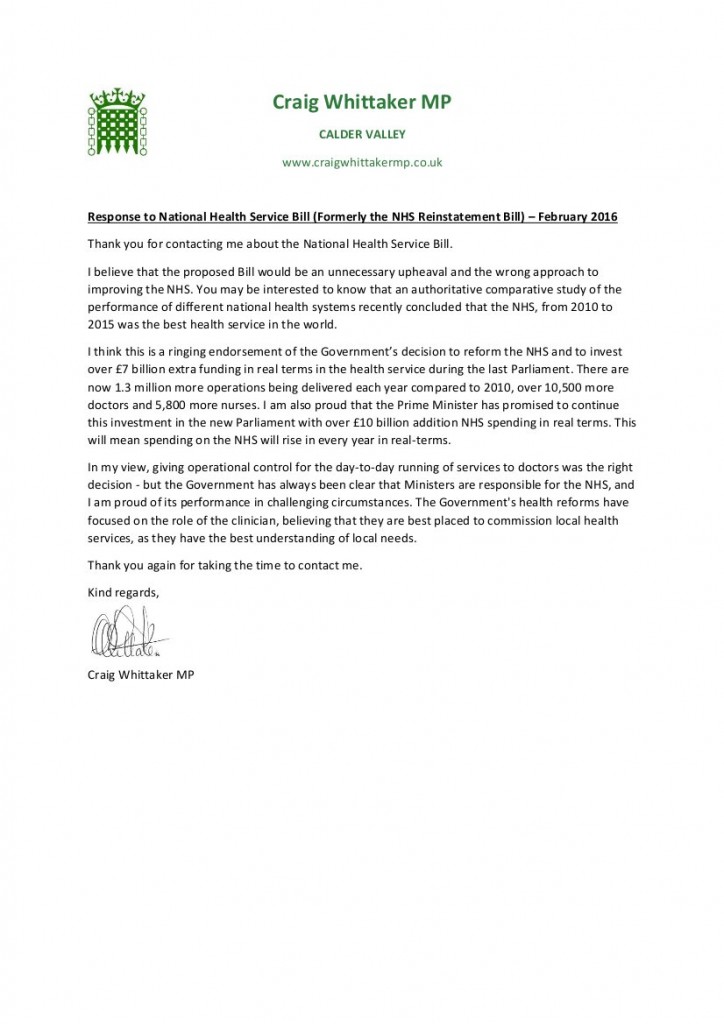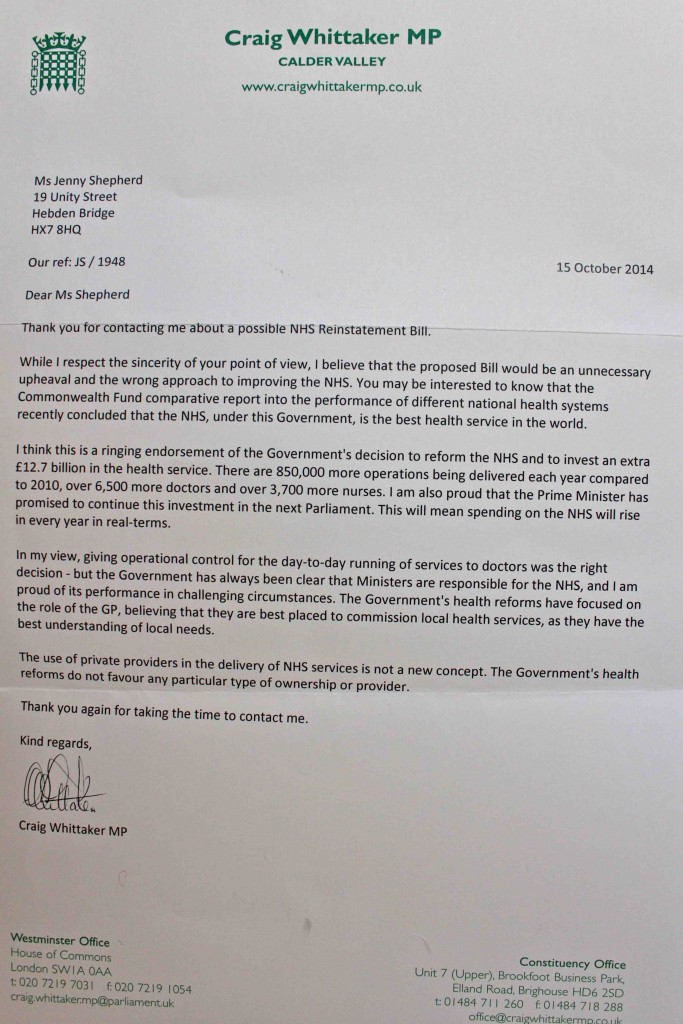Craig Whittaker has posted his refusal to constituents’ requests that he vote for the cross-party NHS (Reinstatement) Bill at its second reading in the House of Commons on 11 March.
His refusal includes the claim that:
“…an authoritative comparative study of the performance of different national health systems recently concluded that the NHS, from 2010 to 2015 was the best health service in the world.”
Here is Craig Whittaker’s refusal to vote for the NHS Bill:
More spin than a tumble dryer
In 2014, Craig Whittaker MP wrote to me:
“…the Commonwealth Fund comparative report into the performance of different national health systems recently concluded that the NHS, under this Government, is the best health service in the world. “
This is spin. The 2013 Commonwealth Fund report was based on 2011 data, when the Coalition government had been in power for one year. 2011 is two years before the Coalition government’s 2012 Health & Social Care Act kicked in, on 1 April 2013. And it is before the £30bn so-called “efficiency savings” from 2011-2015 sliced that much money off the NHS budget.
So the Commonwealth Fund report cannot be, as Craig Whittaker MP claimed in his 2014 letter to me:
“…a ringing endorsement of the Government’s decision to reform the NHS”
Here is the letter Craig Whittaker MP sent me in 2014
This is my letter to Craig Whittaker asking him to vote for the 2016 NHS Bill at its second reading on 11 March
I wrote it before I’d seen his response to other constituents’ requests (see above), that includes the questionable claim that “an authoritative comparative study of the performance of different national health systems recently concluded that the NHS, from 2010 to 2015 was the best health service in the world.”
“Craig Whittaker MP,
House of Commons,
London,
SW1A 0AA 4 March 2016
Dear Craig Whittaker,Please vote for the NHS Bill on 11 March
The cross-party NHS (Reinstatement) Bill is due for its second reading in the House of Commons on the morning of 11 March. Please will you make sure to attend the debate and vote for the Bill?
I know last time I asked you, in October 2014, you said that you wouldn’t vote for it because the 2013 Commonwealth Fund study found that the NHS was the best health service in the world. And you took this as a “ringing endorsement” of the Coalition government’s decision to “reform” the NHS.
However, that study used data from the time before the Coalition government’s NHS efficiency savings of £30bn by 2015 had taken effect. Now we see an NHS stretched to breaking point on inadequate resources, with another £22bn funding shortfall to fill by 2020/21, which is what is driving the proposed Calderdale and Kirklees hospital service cuts and A&E closure in Huddersfield.
Another reason you gave for refusing to vote for the NHS Bill in 2014 was that GPs were best placed to commission local services. But we now see that very few GPs actively participate in Clinical Commissioning Groups Governing Bodies and that CCGs’ policies and programmes are driven by NHS England. They also rely on Commissioning Support Units, that will be privatised on 1 April 2016. Optum, aka United Health, is to be the lead provider for Commissioning Support in most areas. It will also be bidding for contracts to provide NHS services, setting up a gross conflict of interest.
Your third reason was that the Health & Social Care Act 2012 doesn’t favour any particular type of ownership or provider. This was always the claim, although our own CCG has said that their hands are tied by Monitor, when it comes to deciding whether or not to competitively tender services. Now, in a dangerous precedent, Virgin Care has successfully issued a legal challenge to Hull Clinical Commissioning Group because it didn’t use competitive tendering for a contract for 8 GP practices. As a result, the CCG now has to invite private health companies to bid for the GP practices contract.
With no democratic mandate – it was not included in any party’s 2010 election manifesto – the Health and Social Care Act 2012 removed the Secretary of State’s legal duty to provide hospitals, ambulances, nursing and medical services, and more.
Now the NHS in England is being dismantled, bit by bit – despite the fact that 84% of the public want a publicly owned, publicly run NHS (2013 You Gov survey).
The NHS Bill will put the NHS back together, as a comprehensive, universal health service – fully publicly owned and run – that the Secretary of State has a duty to provide and that is free at the point of use and based on patients’ health needs.
The Bill will end the huge waste of money on commercial tendering and contracting that has built up in the NHS over the last 3 decades.
The most conservative estimate is that the Bill will put at least£4.5bn/year back into patient care, after stopping this waste.
It would fill the projected £22bn NHS funding gap by 2020/21; this funding shortage is the reason for proposed cuts to our hospital services – including the closure of Huddersfield A&E.
Implementing the NHS Bill does NOT require another top down reorganisation of the NHS. The Bill proposes a straightforward bottom-up process, driven by existing local bodies, that would return the NHS to full public ownership and management with a minimum of organisational disruption.
This would restore all the fragmented, secretive, commercialised fragments back into a rational, democratically accountable whole.
For these reasons, I hope that this time you will change your mind and vote for the NHS Bill on 11 March.
Kind regards
Jenny Shepherd



Hi Jenny, how is it the government claim that by having GPs on the CCGs will
ensure the best treatment is provided for patients. Doctor knows best.
But at the same time, they choose to ignore the wisdom of the junior doctors
and the BMA when they point out the dangers of the ill thought out contract
being forced on the junior doctors.
David Honeybell.
Good point David. I almost despair.